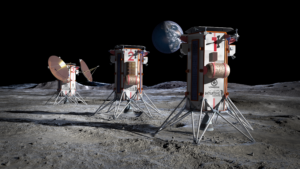St. Petersburg, Fla.-based startup Lonestar Data Holdings plans to place a 16 terabyte (TB) data center on the moon as a proof of concept, using lunar spectrum rights for connectivity to the Earth. It will be on Intuitive Machine’s IM-2 mission, due to launch in 2023 on a SpaceX Falcon 9 rocket, according to reports.
The news comes as data center and interconnection service provider Digital Realty (NYSE: DLR) today published its 2022 “Global Data Insights Survey” based on interviews with 7,295 executives from 23 nations. Of those surveyed, 97% of companies keep data in at least 21 distinct locations.
“Instead of having Earth as a reference body, we have the moon as a reference body in our filing” with the International Telecommunication Union (ITU), Chief Executive Christopher Stott told Connectivity Business News. “We have some S-band for tracking, telemetry and command (TTC) and then we have 1,000 MHz of Ka-band up and down, which should give us 15 gigabits per second (Gbps) each way,” he said.
Latency between the Earth and the moon is 2,800 milliseconds (ms), far beyond the 100 ms or so demanded by cloud applications. Instead of storing the data used all the time, the company plans to store the most valuable data as a backup.
Disaster recovery as a service is “the ultimate CEO failsafe,” Stott said of lunar data storage, adding that the company is talking to insurers about making lunar data backup part of the industry’s offering.
Funding and missions
Lonestar was founded in 2021, and its demonstration mission is fully funded, Stott said. Although Crunchbase lists no funding for Lonestar, the company planned to raise $5.2 million according to a 2021 filing with the Securities and Exchange Commission.

The company is now raising funds for a 5 petabyte (PB) data center, followed by 50 PB and 100 PB data centers. “Our goal is exabyte and zettabyte class facilities,” he added. The company has sold the entire 5 PB storage capacity to a single customer, according to Stott.
Data on the moon will be subject to national jurisdiction when located inside “safety zones” provided for in principle by the 2020 Artemis Accords, Stott said in the paper “Private Sector Utilization of the Moon: A Right of Use,” co-authored with attorney Delbert Smith, formerly of the law firm Dentons, who is a co-founder of and advisor to Lonestar.
The company’s other co-founders are Mark Matossian, former CEO of ICEYE US and before that head of data center hardware manufacturing at Google (NASDAQ: GOOG), as well as Carol Goldstein, former ABN AMRO and Morgan Stanley (NYSE: MS) banker, according to a release.
Connectivity Business Summit, taking place June 14-15 in New York City, will explore the critical strategic and financial issues impacting the global satellite and terrestrial connectivity infrastructure and services industry. In addition to hearing top leaders share their experiences, attendees will take away new insights and invaluable connections. Learn more about the event.








